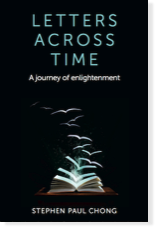MAKING LIFE A BETTER PLACE; OVERCOMING THE OBSTACLES
MAKING LIFE A BETTER PLACE; OVERCOMING THE OBSTACLES
By STEPHEN CHONG
I picked my eldest son up from his school the other afternoon. He was a bit morose so I asked him how his day was.
‘Dad,’ he said, I’d just like to be left alone. I just broke up with my girlfriend.’
‘Okay son,’ said I, ‘I understand how you feel.’
Mind you, this ‘love affair’ had lasted something in the order of about one week, but I did empathise with the lad and understood the pain of such parting, particularly when it was only his second brief foray into the tangled magnificence of ‘affairs of the heart’. I did ask whether they were still friends and he expressed this to the affirmative.
I didn’t press the matter any further until somewhat later. I reflected that although the pain of such broken relationships, for one so young (he’s only fifteen) is highly magnified and supremely heartfelt, the consequences are relatively minor. I related how, when later in life, if we have these forms of relationship break-ups, they can have severe consequences such as separation, divorce, court proceedings, unequal division of possessions and court imposed custody orders for the children … to name but a few of the (ouch!) consequences.
Interestingly enough, he saw the funny side of this and (I think) understood that although he was feeling some degree of emotional pain, ultimately the whole affair could be put down to little more than ‘essential life experience’.
Indeed, throughout life there will be many such trials and challenges to face and overcome. What we need then is a proper perspective and an appreciation of the gravity of the situation.

Let’s first look at what a proper perspective really is …
Perspective is ‘how you look at something’. How you look at something creates ‘how you see it’ … this is perception. How we perceive something, in turn, creates our experience (of the situation).
In other words, how we look at something (our perspective), creates how we see it (our perception) which creates our experience (of the situation). For example, if you were to look into a dark room of your house at night with fear (your perspective), that is how you will see it (your perception will be that the room is a scary place to be). Then, when you enter the dark room, that is what you experience (fear). It’s kind of like a viscious circle. So in reality, (staying with our example) we have created our own experience (of fear) by the way we look at things.
But let’s turn this around a bit …
What if you looked into the dark room and thought, ‘that’s not scary’. There’s nothing to be afraid of. It’s the same room as it was during the daytime and that wasn’t scary. Well, your perspective has just been altered dramatically. So, when you go into the room, you feel confident and assured and you go about your business without fear or anxiety (and hopefully find a light switch).
So, let’s get things into perspective shall we. Let’s change some of the old perspectives (that hold us back). Try these for size:
“I’m afraid, I’m scared” … change to … “I’m capable, I can do it.”
“I’ll never be any good” … change to … “I’m a worthwhile human being with plenty of great talents”
“I don’t care” … change to … “This is important and I need to do/say it”
“It’s all your fault” … change to … “I’m willing to face the consequences of my actions”
Here’s a website that you may like to visit: http://en.wikipedia.org/wiki/Holmes_and_Rahe_stress_scale
This site describes the Holmes and Rahe stress scale. Based on medical records and research, it outlines and rates ‘life events’ and places them on a scale relating to how much stress the event caused. There is a scale for adults and one for young-adults.
What may be really cool to do is to rate your challenging life experiences against the ‘life change units’ expressed on the scale. This will help you put the gravity of the situation into a relative perspective and see how important the event is in terms of other life events.
Based on the rating scale, I suspect that my son’s ‘broken heart’ experience would rate somewhere between 5 to 10 … what do you think?

About the Author:
Stephen Chong M.Ed. is a personal development coach, keynote speaker and author. He is Author of ‘Letters Across Time: A journey of enlightenment’ www.stephenchong.com.au
